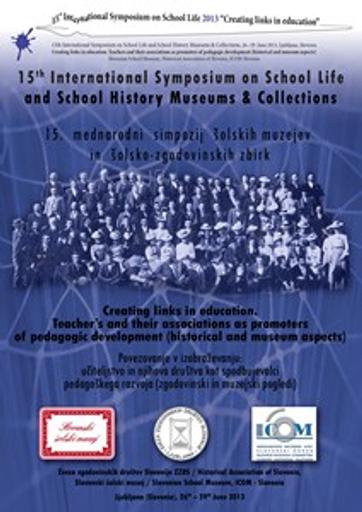/
Dogodki
/
Konference
Using Museums as an Educational Resource for the Mentally Disabled: A Case Example


To delo avtorja Çağla Nezehat Saraç je ponujeno pod Creative Commons Priznanje avtorstva-Nekomercialno-Brez predelav 4.0 Mednarodna
Datoteke (1)
Opis
The object of this paper is to share the results of a museological study which involved the planning and realization of an educational program for a group of mentally disabled students. The aim of the study was to research relative literature on special groups’ and their teachers’ experiences at the museum; and then to create, put into practice and evaluate the outcomes of an exemplary educational program. Having completed this in 2002, the author, after ten years, is to now follow-up on the long-term effects of the educational program on the parties involved. The parties to be interviewed are the group of students which have taken part in the program, the particular museum’s current personnel at which part of the program had taken place, and the personnel of the special educational institute at also which part of the program had taken place. The methodology of the study had included literature review, educational program development, interviews, in-class presentations and discussions, trip to and exercises at the museum, and drama. The results of the study are cataloged as written and visual material produced by the group of students who have participated in the program. These are to be presented as a ppt. along with personal observations and evaluation of the author. Overall, the paper will attempt to show how museums may be used as places for social integration and life-long personal development for the mentally disabled. It will also try to measure ‘learning’ in the long term on the parties involved.
Metapodatki (12)
- identifikatorhttps://hdl.handle.net/11686/37689
- naslov
- Using Museums as an Educational Resource for the Mentally Disabled: A Case Example
- Zihinsel engelliler için müzelerin bir eğitim kaynağı olarak kullanımı: Bir uygulama örneği
- ustvarjalec
- Çağla Nezehat Saraç
- soavtor
- Delphine Campagolle (mod.)
- predmet
- zgodovina
- šolstvo
- muzej
- history
- school system
- museum
- opis
- The object of this paper is to share the results of a museological study which involved the planning and realization of an educational program for a group of mentally disabled students. The aim of the study was to research relative literature on special groups’ and their teachers’ experiences at the museum; and then to create, put into practice and evaluate the outcomes of an exemplary educational program. Having completed this in 2002, the author, after ten years, is to now follow-up on the long-term effects of the educational program on the parties involved. The parties to be interviewed are the group of students which have taken part in the program, the particular museum’s current personnel at which part of the program had taken place, and the personnel of the special educational institute at also which part of the program had taken place. The methodology of the study had included literature review, educational program development, interviews, in-class presentations and discussions, trip to and exercises at the museum, and drama. The results of the study are cataloged as written and visual material produced by the group of students who have participated in the program. These are to be presented as a ppt. along with personal observations and evaluation of the author. Overall, the paper will attempt to show how museums may be used as places for social integration and life-long personal development for the mentally disabled. It will also try to measure ‘learning’ in the long term on the parties involved.
- Bu makalenin amacı, zihinsel engelli bir öğrenci grubu için planlanan ve uygulanan eğitim programını içeren müzeolojik çalışmanın sonuçlarını paylaşmaktır . Çalışmanın amacı, özel grupların ve onların eğitmenlerinin müze deneyimleri hakkında literatür taraması yapmak, ve örnek olabilecek bir müze eğitim programı yaratmak, uygulamak ve sonuçlarını değerlendirmek idi. 2002 yılında tamamlanan çalışmadan on yıl sonra yazar, çalışmaya katılan grup ve kurumlar üzerinde eğitim programının uzun dönem etkilerini izleyecektir. Mülakat yapılacak gruplar, programa katılmış olan öğrenci grubu, çalışmanın gerçekleştirildiği müze ve özel eğitim kurumunun bugünkü çalışanları olacaktır. Çalışmanın tamamlanmış kısmında metodoloji, literatür taraması, eğitim programı geliştirme, mülakatlar, sınıf içi sunumlar ve tartışmalar, müze ziyareti ve uygulamaları, ve drama çalışmasını kapsamıştır. Çalışmanın sonuçları, programa katılan öğrenciler tarafından üretilmiş yaz ılı ve görsel malzeme olmak üzere kataloglandırılmıştır. Bu malzeme, yazarın kişisel gözlemleri ve değerlendirmesi ile birlikte sunulacaktır. Bütününde makalemiz, müzelerin, zihinsel engellilerin sosyal entegrasyonu ve hayat boyu kişisel gelişiminde bir me kan olarak nasıl kullanılabileceğini göstermeye teşebbüs etmektedir. Ayrıca katılımcı, tarafların uzun vadede 'öğrenimlerini' ölçmeye çalışacaktır.
- založnik
- Slovenski šolski muzej
- Zveza zgodovinskih društev Slovenije
- ICOM Slovenija
- Inštitut za novejšo zgodovino
- datum
- 2013
- 27. 06. 2013
- tip
- video
- jezik
- Angleščina
- jeDelOd
- pravice
- licenca: ccByNcNd
